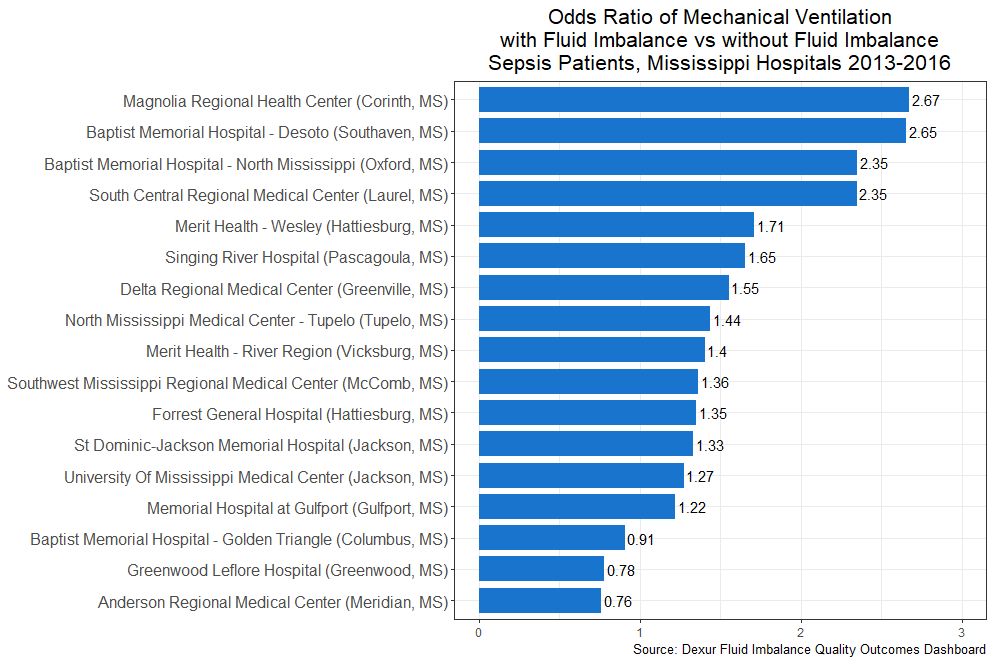Fluid Imbalance Is Associated with More Severe Sepsis Hospitalizations
In Fluid Imbalance
Get Dexur’s Personalized Hospital Specific Presentation on Quality, Safety, Compliance & Education
By: James Pitt Jun. 15, 2018
Following Dexur's examination of the length of stay (LOS) in sepsis patients in Mississippi, analysts examined how fluid imbalance relates to case mix. CMS divides sepsis patients into three diagnosis-related groups:
- DRG 870 SEPTICEMIA OR SEVERE SEPSIS W MV 96+ HOURS
- DRG 871 SEPTICEMIA OR SEVERE SEPSIS W/O MV 96+ HOURS W MCC
- DRG 872 SEPTICEMIA OR SEVERE SEPSIS W/O MV 96+ HOURS W/O MCC
In more severe diagnosis-related groups, more patients have a fluid imbalance, and length of stay is longer. DRG and LOS both measure how severe a patient's condition is, and fluid imbalance correlates with both of them.
| Average hospital in this group | Sepsis without major complications/ comorbidities (DRG 872) | Sepsis with major complications/ comorbidities (DRG 871) | Sesis with mechanical ventilation (DRG 870) |
|---|---|---|---|
| % of patients with fluid imbalance | 17% | 25% | 44% |
| Average length of stay (days) | 5.0 days | 6.9 days | 14.6 days |
Within each hospital, a greater percentage of DRG 870 patients have a fluid imbalance, and DRG 870 patients average longer lengths of stay. These figures vary more widely within DRG 870 than in the other two DRGs. These differences may reflect different mechanical ventilation practices at different hospitals or patient populations with differing severities within DRG 870.

Patients with fluid imbalance were more likely to be on mechanical ventilation than patients without fluid imbalance. The average odds ratio was 1.57. This indicates that patients with fluid imbalance were about half again as likely to be on mechanical ventilation as patients without fluid imbalance. The highest odds ratio was 2.67 at Magnolia Health Center (Corinth, MS), and the lowest 0.76 at Anderson Regional Medical Center (Meridian, MS).

A 2005 New England Journal of Medicine study by Wiedemann et. al found that conservative fluid management can improve lung function and reduce the necessary duration of mechanical ventilation.
DEXUR PRO MEMBERS GET ACCESS TO:
- Total DRG Discharges
- Total Fluid Imbalance Discharges at DRG
- % of Fluid Imbalance Discharges at DRG
- Average LOS at DRG
For DRGs 870, 871, and 872, from 2013-2016 for below hospitals:
- Anderson Regional Medical Center (Meridian, MS)
- Baptist Memorial Hospital - Desoto (Southaven, MS)
- Baptist Memorial Hospital-Golden Triangle (Columbus, MS)
- Baptist Memorial Hospital-North Mississippi (Oxford, MS)
- Delta Regional Medical Center (Greenville, MS)
- Forrest General Hospital (Hattiesburg, MS)
- Greenwood Leflore Hospital (Greenwood, MS)
- Magnolia Regional Health Center (Corinth, MS)
- Memorial Hospital at Gulfport (Gulfport, MS)
- Merit Health - Biloxi (Biloxi, MS)
- Merit Health - Central (Jackson, MS)
- Merit Health - River Region (Vicksburg, MS)
- Merit Health - Wesley (Hattiesburg, MS)
- North Mississippi Medical Center-Tupelo (Tupelo, MS)
- Rush Foundation Hospital (Meridian, MS)
- Singing River Hospital (Pascagoula, MS)
- South Central Regional Medical Center (Laurel, MS)
- Southwest Mississippi Regional Medical Center (McComb, MS)
- St Dominic-Jackson Memorial Hospital (Jackson, MS)
- University Of Mississippi Medical Center (Jackson, MS)
ABOUT THE AUTHOR
